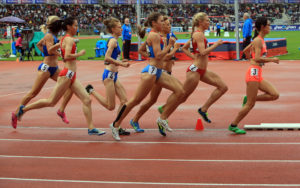Whistleblower of the Year Candidate -- Russian Doping Whistleblowers Yuliya and Vitaly Stepanov

By Ari Yampolsky
This “Whistleblower Spotlight” features another of our Whistleblower of the Year candidates, the Russian doping whistleblower pair of Yuliya and Vitaly Stepanov. Together, they took a bold stand against what they saw as major corruption in the recently revitalized Russian sports machine. In doing so, they exposed one of the biggest international doping scandals in sports history. But they also changed their lives forever.
In recent years, a sports colossus has arisen in Russia. Led by one-time judo master Vladimir Putin, Russia has sought to achieve international sports dominance with a patriotic fervor usually reserved for military parades. The Russian government has thrown mountains of cash at international sports organizations to land marquee events. President Putin reportedly spent more than $51 billion alone on the 2014 Winter Olympic Games in Sochi, making them the most expensive Olympics in history. And that says nothing of other major international events Russia has secured, including the 2013 IAAF World Championships in track and field, the 2015 World Swimming Championships, and the 2018 FIFA Soccer World Cup.
If money can buy sporting success, Russia seemed to have turned the tide on its previously middling performance. At the 2010 Winter Olympics in Vancouver, for instance, Russian athletes won three gold medals and finished eleventh in the total medal count; just four years later, in Sochi, Russia won 33 medals, 13 of them gold—the most of any nation in both categories. Russian cross-country skiers who placed eighth in 2010 had an unprecedented 1-2-3 finish in the men’s 50km event in Sochi. Russian track-and-field athletes similarly vaulted into the stratosphere. In 2010, Russian women won three of the six marathon majors, in Chicago, London and Tokyo. Then, in 2009, 2010, and again in 2011, Liliya Shobukhova won the Chicago Marathon three years in a row—a feat no runner had achieved before.
But while fans celebrated Russia’s routing of its competitors, global sports regulators wondered whether the government provided more than just cash to support the nation’s athletes. The work of two courageous whistleblowers—Yuliya Stepanova (née Rusanova), an elite middle-distance runner serving a suspension for doping, and her husband, Vitaly Stepanov, a former employee of Russia’s anti-doping agency—turned that idle speculation into concrete fact. And it triggered the deepest crisis in Russian sports since a global boycott hit the 1980 Moscow Olympics.
Over almost two years, the Stepanovs secretly recorded coaches and athletes describing their use of performance-enhancing drugs, exposing large-scale doping fraud in Russian sports. The couple’s evidence featured in a German documentary broadcast in December 2014 that alleged that Russian officials—including the head of the official anti-doping center in Moscow and the leader of the All-Russia Athletic Federation’s medical department—provided banned substances to athletes and covered up positive tests in exchange for a percentage of winnings. The film interviewed former top Russian athletes who described the systematic doping of “99%” of their ilk. And the Stepanovs’ undercover footage showed star athletes obtaining banned substances.
The film sparked a wide-ranging investigation by the World Anti-Doping Agency (WADA) that culminated in a scathing investigatory report published in November 2015. WADA accused Russia of systematic, state-sponsored doping, backed by bribery, espionage, and intimidation. Predictably, Stepanova was the star witness: the 323-page report mentions her name 141 times.
The fallout from the Stepanovs’ public airing was severe—and it continues today. WADA suspended Russia’s anti-doping agency, as well as the latter’s accredited testing laboratory. Russian track-and-field athletes have been provisionally banned from competing in international competitions. And just days ago, every senior manager of Russia’s anti-doping agency resigned.
So have the Stepanovs been hailed for exposing what Vladimir Putin has called the “poison” of doping? Hardly. Instead, the Russian media has portrayed Vitaly and Yuliya as tools of Western political interests. Stepanova’s former coach impugned her as a “traitor” on Russian television. And high-level officials—including Russia’s Sports Minister, who said he was “disgusted with the whistleblowers”—have suggested the duo fabricated the story to get citizenship in a foreign country.
Unfortunately, that last smear may have a grain of truth, though as consequence rather than cause. Anticipating negative reaction, the Stepanovs left Russia just before the German documentary aired. A couple without a home, the Stepanovs and their young child have been in hiding for over a year. The torrent of criticism they faced, which incited anger and further retaliation against them, makes their choice to flee seem well-advised.
For the courage it took to confront the behemoth of state-sponsored doping in Russia, we nominate Yuliya and Vitaly Stepanov as Whistleblowers of the Year.
Tagged in: Whistleblower of the Year,